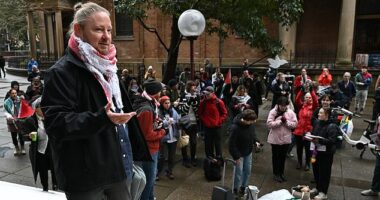One of the nation’s top legal authorities has turned against his Supreme Court colleagues in a fiery dissent to their majority decision to halt President Trump’s mass deportations.
Justice Samuel Alito issued an extraordinary dissent, joined by fellow conservative Justice Clarence Thomas, slamming the seven-member majority decision.
The Supreme Court ruled early on Saturday morning that the Trump administration must not deport any Venezuelans held in a northern Texas detention facility under an 18th-century wartime law which has been the basis for its actions so far.
The administration invoked the Alien Enemies Act of 1798 to justify sending hundreds of suspected gang members and illegal migrants to a hellish El Salvadorian prison last month.
Alito’s sharp dissent argued the court acted ‘literally in the middle of the night’ and with ‘dubious factual support’ to take the extraordinary measure of blocking the government.
‘Both the Executive and the Judiciary have an obligation to follow the law,’ he said, warning his colleagues to ‘follow established procedures’ in the decision-making process.
‘Literally in the middle of the night, the Court issued unprecedented and legally questionable relief.’
He said the Supreme Court acted ‘without giving the lower courts a chance to rule, without hearing from the opposing party, within eight hours of receiving the application, with dubious factual support for its order, and without providing any explanation for its order.

Justice Samuel Alito (bottom row, second from right) issued an extraordinary dissent, joined by fellow conservative Justice Clarence Thomas (bottom row, second from left), slamming the seven-member majority decision

The administration invoked the Alien Enemies Act of 1798 to justify sending hundreds of suspected gang members and illegal migrants to a hellish El Salvadorian prison last month
‘I refused to join the Court’s order because we had no good reason to think that, under the circumstances, issuing an order at midnight was necessary or appropriate.’
Conservatives hold a majority in the Supreme Court, but high profile Trump appointees Brett Kavanaugh and Amy Coney Barrett signed off on the decision.
The majority did not provide a detailed explanation in the order early Saturday, as is typical. A brief order directed the administration not to remove Venezuelans held in the Bluebonnet Detention Center ‘until further order of this court.’
But the court previously said deportations could proceed only after those about to be removed had a chance to argue their case in court and were given ‘a reasonable time’ to contest their pending removals.
More than 200 suspected gang members are languishing in an El Salvadorian hellhole prison as the Trump administration makes good on its promise to crack down on illegal migration.
The move sparked legal challenges and widespread division amid concerns that some of the people rounded up and deported were mistakenly targeted. Most recently, podcaster Joe Rogan expressed concerns about the policy.
At the center of the division is 29-year-old father Kilmar Abrego Garcia, who supporters say was wrongly deported.
Alito said the legal filings, ‘while alleging that the applicants were in imminent danger of removal, provided little concrete support for that allegation.’
He noted that while the court did not hear directly from the government regarding any planned deportations under the Alien Enemies Act in this case, a government lawyer in a different matter had told a US District Court in a hearing Friday evening that no such deportations were then planned to occur on Good Friday or Easter Saturday.

Trump has repeatedly slammed the many legal challenges to his policy, which was one of his promises on the campaign trail

Alito said the legal filings, ‘while alleging that the applicants were in imminent danger of removal, provided little concrete support for that allegation’

The act allows the President to forcibly remove citizens of an ‘enemy nation’ who it deems to be ‘dangerous to the peace and safety of the United States’ or involved in ‘treasonous’ acts
The Trump administration later Saturday filed paperwork urging the high court to reconsider its hold.
Press secretary Karoline Leavitt wrote on X: ‘We are confident we will ultimately prevail against the onslaught of meritless litigation brought by radical activists.’
The controversial act at the center of the legal back and forth has been invoked just three times in US history – including during both World Wars.
It allows the President to forcibly remove citizens of an ‘enemy nation’ who it deems to be ‘dangerous to the peace and safety of the United States’ or involved in ‘treasonous’ acts.
Challenges have been making their way through various courts since the act was invoked.
But the American Civil Liberties Union lodged an emergency filing on Friday warning that authorities had started to accuse men in the Texas detention facility of being members of the notorious Tren de Aragua gang.
Such an accusation could lead them to fall foul of the act and could result in their deportation to El Salvador.







